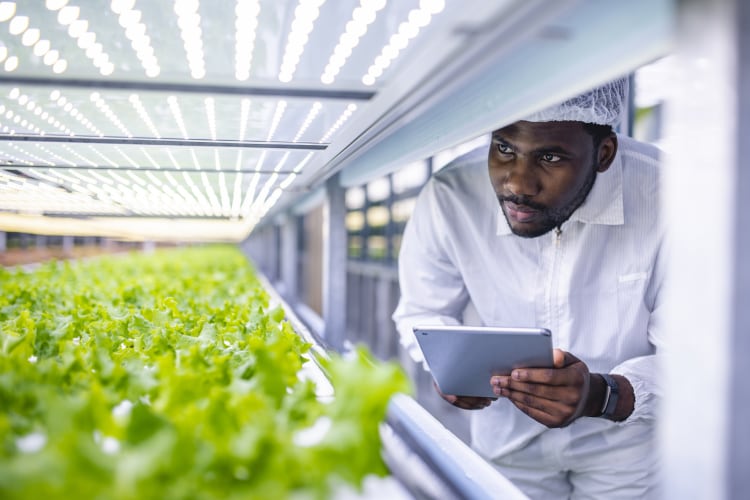In what it coins the ‘greenhouse hub’ of Europe, Israeli-Dutch start-up Future Crops, Ltd. has established a fully automated 8,000m2 indoor vertical farm in Westland, the Netherlands.
Nine stories high, and powered predominantly by solar energy, Future Crops said the indoor vertical farming system provides optimal growing conditions for a variety of herbs and leafy greens.
But what is particularly unique about the start-up’s operation, co-founder and CEO Gary Grinspan tells FoodNavigator, is that its crops grow not in liquid, but in soil.
Growing stability and resistance
“Most vertical farms use hydroponics systems to grow their crops. With hydroponics systems roots are embedded in a water or fluid medium,” Grinspan explained.
Future Crops’ system, on the other hand, ‘keeps the growing conditions close to land’. “Roots are embedded into a substrate-based medium which is a special mixture of existing substrate-based materials.”
What medium the crops grow in affects their final quality, the CEO suggested. “The medium in which you grow your crops will define quality, taste, smell, shelf-life, and many other parameters.
“This earth-like substrate acts as a buffer, which grants more stability to the crops and makes them more resistant to contaminants.”

Future Crops says its system can consistently grow a comprehensive range of herbs and leafy microgreens throughout the year, completely free of any pesticides or biological substances.
At present, the start-up is growing basil, Thai basil, parsley, coriander and dill, amongst others. In the leafy green range, iceberg, romaine and Batavia lettuce varieties are also cultivated by Future Crops.
“We are also in the development of new vegetables,” Grinspan revealed.
100% renewable energy vision
Future Crops kickstarted its R&D in Israel via a strategic partnership with the Agricultural Research Organisation (ARO).
This Israeli ‘know-how’ was then transferred to the Netherlands, where the start-up’s local team of agronomists developed the technology and infrastructure. Future Crops also has an R&D centre in Holland where it continues to develop its know-how in vertical farming, based on data-driven technology.
Future Crops’ indoor farming system tailors the ideal environmental conditions for crops to thrive, the start-up explained, within a ‘highly-controlled, automated structure’. The system controls ‘dozens’ of parameters of growth conditions, including humidity, temperature and lighting to create optimal climatic conditions to suit each crop.
In this way, the crops are grown with ‘zero dependence on climate conditions’, while maximising yield per area in comparison to traditional agriculture.

Vertical farming systems are designed to outperform traditional agriculture in a variety of ways.
“Crops grown in the Future Crops vertical farm have demonstrated a longer shelf-life and reach full growth in significantly less time, enabling multiple growth cycles,” noted the start-up. “This significantly shortens the farm-to-table supply chain by weeks, including reducing food mileage.”
The systems’ reduced dependence on limited natural resources is also in its favour. With the global population forecast to reach 10bn over the next decade, a lack of availability of fertile land dedicated to agriculture is expected to strain the planet. This, Future Crops stressed, is further compounded by climatic instability.
“These trends have challenged the agricultural industry to rethink the farming paradigm in a way that allows greater productivity in a more sustainable manner, with less use of resources.”
While vertical farming systems require significantly less land and water, their energy consumption has been a point of contention.
Powering LED lighting and temperature control systems is energy-intensive. Green energy will need to be leveraged in order to reduce vertical farming systems’ carbon footprint.
“We are using 18,000 solar panels that provide us with renewable solar energy, which represents about 50% of our total energy,” Grinspan told this publication.
“Our vision is to be 100% renewable energy in the near future.”
Is vertical farm-grown veg organic?
Future Crops sells its products both private label and own-brand, depending on the retail strategy.
It currently runs supply contracts with a leading grocery retailer in the Netherlands, as well as additional retailers in Europe.
When consumers purchase its own brand ‘Eve’, the benefits of production are made clear on-pack, notably ‘zero pesticides guaranteed’, ‘sustainable agriculture’, ‘no need to wash’, and ‘longer shelf-life’.
“Other advantages are the quality and taste profile, local produce all year round for Dutch consumers, and more,” said the CEO.
“Our aim is to be price parity compared to regular products, or at least not more expensive than organic produce.”

So in that Future Crops doesn’t use herbicides or pesticides, does that mean it’s organic?
“Our standards of production are beyond organic, as we do not use any chemical or biological or other substances for our crops,” we were told.
Indeed, in the US, and in ‘most’ other countries in the world (besides those in the EU), Future Crops could be certified organic. In EU legislation, however, the roots of a vegetable must be connected to the ground to be considered organic.
“However, we do communicate in Europe that our products have a zero pesticides guarantee, which is mainly what organic consumers care about.”




